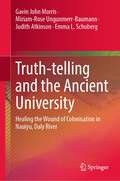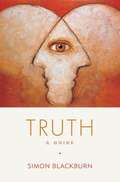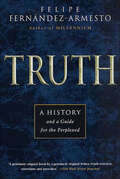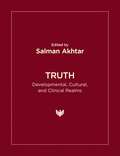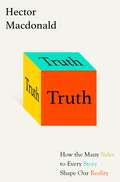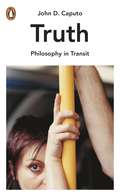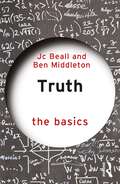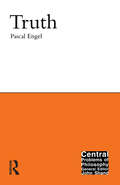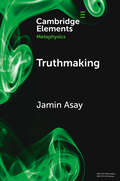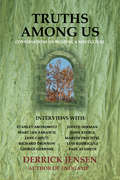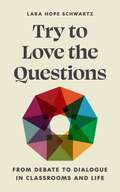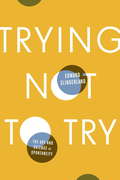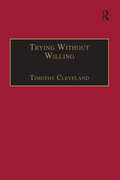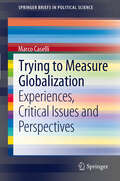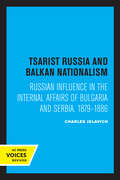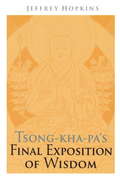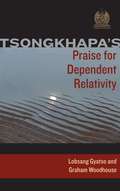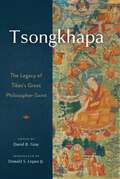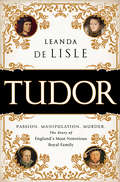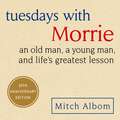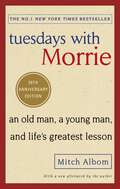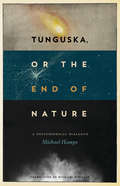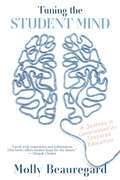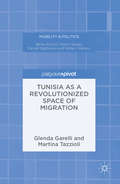- Table View
- List View
Truth-telling and the Ancient University: Healing the Wound of Colonisation in Nauiyu, Daly River
by Gavin John Morris Miriam-Rose Ungunmerr-Baumann Judith Atkinson Emma L. SchubergThis book shares a strength-based truth-telling model, which reveals the trauma associated with the experience of colonisation and the traditional healing practices specific to the Nauiyu Nambiyu community in Australia. It explores the significance of community placed on developing the 'Ancient University', an Aboriginal-based, stand-alone healing centre that incorporates traditional healing practices. This book outlines the truth-telling model, which was developed by the Nauiyu community to address a community need. This unique approach represents a deliberate shift from decolonial scholarship, which merely captures Indigenous voice speaking back to the colonisers. This book explores Indigenous critical pedagogies to investigate theoretical frameworks with implications for planning, learning and teaching which are culturally responsive in a variety of contexts. It is the first of its kind that utilises an Indigenous research methodology on the country and with the people to which it belongs.
Truth: A Guide
by Simon BlackburnThe author offers a tour de force exploration of what he calls "the most exciting and engaging issue in the whole of philosophy"―the age-old war over truth. The front lines of this war are well defined. On one side are those who believe in plain, unvarnished facts, rock-solid truths that can be found through reason and objectivity―that science leads to truth, for instance. Their opponents mock this idea. They see the dark forces of language, culture, power, gender, class, ideology and desire―all subverting our perceptions of the world, and clouding our judgement with false notions of absolute truth. Beginning with an early skirmish in the war―when Socrates confronted the sophists in ancient Athens―Blackburn offers a penetrating look at the longstanding battle these two groups have waged, examining the philosophical battles fought by Plato, Protagoras, William James, David Hume, Hans-Georg Gadamer, Jacques Derrida, Michel Foucault, Richard Rorty, and many others, with a particularly fascinating look at Nietzsche. Among the questions Blackburn considers are: is science mere opinion, can historians understand another historical period, and indeed can one culture ever truly understand another. He concludes that both sides have merit, and that neither has exclusive ownership of truth. What is important is that, whichever side we embrace, we should know where we stand and what is to be said for our opponents.
Truth: A History and a Guide for the Perplexed
by Felipe Fernández-ArmestoWritten by a renowned Oxford historian, this fascinating volume presents a global history of truth. Sharp and authoritative, Truth manages to touch every period of human experience; it leaps from truth-telling technologies of "primitive" societies to the private mental worlds of great philosophers; from spiritualism to science and from New York to New Guinea. In clear, lucid prose, this little book takes on an enormous subject and makes it understandable to anyone.
Truth: Developmental, Cultural, and Clinical Realms
by Salman AkhtarThis edited collection gathers together erudite and considered contributions from Salman Akhtar, Cobi Avshalom, Brett Clarke, Mali Mann, Gila Ofer, Thomas Ogden, Louis Rothschild, Batya Shoshani, Michael Shoshani, Naama Shoshani-Breda, Ann Smolen, Donald Spence, Richard Waugaman, Thomas Wolman, and Vamik D. Volkan. Fifteen distinguished authors bring together their vast experience as psychologists, psychiatrists, psychoanalysts, social workers, and psychotherapists to present a nuanced and in-depth investigation into the concept of truth. Divided into five parts, the book begins with a thoughtful discussion from Brett Clarke on what truth means and its role in psychoanalysis. It then moves into the realm of development, looking at truth from the viewpoint of children, adolescents, and adults. Stepping from development to culture, the works of Shakespeare, Heidegger and Freud are brought into the debate alongside the relationship of truth with individual and large-group psychology. Next come four chapters taking 'truth' into the clinical realm, grounding theory in practice. The book is brought to completion by an epilogue from Louis Rothschild answering the vital question: 'Truly, what does all this mean?' A must-read book for practising clinicians and academics in the mental health and humanities fields that investigates the wide range of theories on truth, how they have changed over the years, and their practical applications.
Truth: How the Many Sides to Every Story Shape Our Reality
by Hector MacDonaldFrom one of the world's leading experts in business storytelling, and for readers of Daniel Levitin, Nate Silver, and Charles Duhigg, Truth: A User's Guide is about the different types of competing truths we face every day in life: how to identify them, why they work, when they are used and misused, and what we can do to guard against them or--when appropriate--to make constructive use of them.We tend to see the world like Orwell's Winston Smith: "There was truth and there was untruth." Yet the world is far more complicated than that. In a time of "post-truth", when "fake news" is itself the subject of our headlines, it is not "untruths" that we need to worry about. Hector Macdonald reveals and examines one of our greatest collective blind spots: we are all routinely misled by the truth. This is because for any fact, scenario, story, and situation, there are what Hector terms "Competing Truths." Why do Competing Truths matter? They matter because we vote, shop, work, co-operate, and fight based on what we believe to be true, and what we believe depends in large part on what we read or hear from others. Many of the most sophisticated and influential forms of political, business, and media communication manipulate technically true statements to pull the wool over the public's eyes. Truth is not an absolute--it has its own spectrum. Truth: A User's Guide shows us how to cut through the nebulous issue of truth using a scaffold of timely examples. These examples range from the disingenuous use of statistics in Donald Trump's speeches to the 2013 fallacy that Western quinoa demand was disadvantaging native Andean farmers, to the structure, ethics, and success of Uber. Macdonald is as comfortable and insightful parsing the influence of Facebook as he is examining Colgate's misleading campaign as the toothpaste recommended by dentists. Truth: A User's Guide explores how we can guard against the noise of competing truths, in business, in our personal relationships, and within ourselves, but also how we can use them to our advantage. Written with authority and humour, this is an accessible and illuminating narrative that will find a wide audience among readers in search of understanding why the meaning of "truth" seems to have gone completely haywire.
Truth: Philosophy in Transit (Philosophy in Transit)
by John D. CaputoIn the first in a new series of easily digestible, commute-lengthbooks of original philosophy, renowned thinker John D. Caputo explores the many notions of 'truth', and what it really meansRiding to work in the morning has has become commonplace. We ride everywhere. Physicians and public health officials plead with us to get out and walk, to get some exercise. People used to live within walking distance to the fields in which they worked, or they worked in shops attached to their homes. Now we ride to work, and nearly everywhere else. Which may seem an innocent enough point, and certainly not one on which we require instruction from the philosophers. But, truth be told, it has in fact precipitated a crisis in our understanding of truth. Arguing that our transportation technologies are not merely transient phenomena but the vehicle for an important metaphor about postmodernism, or even constitutive of postmodernism, John D. Caputo explores the problems posited by the way in which science, ethics, politics, art and religion all claim to offer us (the) "truth", defending throughout a "postmodern", or "hermeneutic" theory of truth, and posits his own surprising theory of the many notions of truth.John D. Caputo is a specialist in contemporary hermeneutics and deconstruction with a special interest in religion in the postmodern condition. The Thomas J. Watson Professor of Religion Emeritus at Syracuse University and the David R. Cook Professor of Philosophy Emeritus at Villanova University, he has spearheaded an idea he calls weak theology.
Truth: The Basics (The Basics)
by Jc Beall Ben MiddletonTruth: The Basics is a concise and engaging introduction to philosophical theories about the nature of truth. The two authors – leading philosophers in this field – build the book around a single question: what, if anything, is common to all truths, which makes them true? The book explores five important answers (‘theories’) to the given question: correspondence, semantic, verifiability, transparency, and plurality. For each given theory, the following questions are addressed: • What is the theory’s answer to the central question?• What is the basic motivation behind that answer?• What is a precise argument for that answer?• What are the biggest objections to that answer?• What are a few good resources for understanding more about the theory? An additional chapter provides an extensive introduction to the notorious liar paradox. Truth: The Basics is an ideal starting point for anyone seeking a lively and accessible introduction to the rich and complex philosophical study of truth. Key Features:> Written in a clear and concise fashion.> Clearly explains five major theories of truth for an uninitiated readership of undergraduate students and general readers.> Prepares the reader to tackle more advanced work in truth studies.> Makes connections between truth and other areas of philosophy, including the philosophy of language, semantics, metaphysics, logic and epistemology.> Includes technical appendices for more advanced readers.
Truth: Truth And Success (Central Problems Of Philosophy Ser. #4)
by Pascal EngelIn this critical introduction to contemporary philosophical issues in the theory of truth Pascal Engel provides clear and authoritative exposition of recent and current ideas while providing original perspectives that advances discussion of the key issues. This book begins with a presentation of the classical conceptions of truth - the correspondence theory, the coherence theory and verificationist and pragmatist accounts - before examining so-called minimalist and deflationist conceptions that deny truth can be anything more than a thin concept holding no metaphysical weight. The debates between those who favour substantive conceptions of the classical kind and those who advocate minimalist and deflationist conceptions are explored. Engel argues that, although the minimalist conception of truth is basically right, it does not follow that truth can be eliminated from our philosophical thinking as some upholders of radical deflationist views have claimed. Questions about truth and realism are examined and the author shows how the realism/anti-realism debate remains a genuine, meaningful issue for a theory of truth and has not been undermined by deflationist views. Even if a metaphysical substantive theory of truth has little chance to succeed, Engel concludes, truth can keep a central role within our thinking, as a norm or guiding value of our rational inquiries and practices, in the philosophy of knowledge and in ethics.
Truthmaking (Elements in Metaphysics)
by Jamin AsayTruthmaking is the metaphysical exploration of the idea that what is true depends upon what exists. Truthmaker theorists argue about what the truthmaking relation involves, which truths require truthmakers, and what those truthmakers are. This Element covers the dominant views on these core issues in truthmaking. It also explores some key metaphysical topics and debates that are usefully approached by employing the tools of truthmaker theory: the debate between presentists and eternalists over the existence of entities from the past, and the debate between actualists and possibilists over merely possible states of affairs. In the final section, the Element explores how to think about truthmakers for truths involving social constructions.
Truths Among Us: Conversations on Building a New Culture (Flashpoint Press)
by Derrick JensenFrom acclaimed author Derrick Jensen comes a prescient, thought-provoking collection of interviews with 10 leading writers, philosophers, teachers, and activists who argue against society's belief that corporations and governments know what is best for the future, instead choosing to help acknowledge the values we know in our hearts are right—and inspire within us the courage to act on them. Among those who share their wisdom here are acclaimed sociologist Stanley Aronowitz, who shows that science is but one lens for discovering knowledge; Luis Rodriguez, poet and peacemaker, who suggests embracing gang members as people instead of stereotypes; Judith Herman, who offers a deeper understanding of the psychology of abusers; Paul Stamets, who reveals the power of fungi that is often ignored; and writer Richard Drinnon, who reminds us that our spiritual paths need not be narrowed by the limiting mythologies of Western civilization. Reaching toward a common goal of harmony with the world surrounding us all, these diverse voices articulate different yet shared visions of activism.
Try to Love the Questions: From Debate to Dialogue in Classrooms and Life (Skills for Scholars)
by Lara SchwartzAn essential guide to dialogue in the college classroom and beyondTry to Love the Questions gives college students a framework for understanding and practicing dialogue across difference in and out of the classroom. This invaluable guide explores the challenges facing students as they prepare to listen, speak, and learn in a college community and encourages students and faculty alike to consider inclusive, respectful communication as a skill—not as a limitation on freedom.Among the most common challenges on college campuses today is figuring out how to navigate our politically charged culture and engage productively with opposing viewpoints. Lara Schwartz introduces the fundamental principles of free expression, academic freedom, and academic dialogue, showing how open expression is the engine of social progress, scholarship, and inclusion. She sheds light on the rules and norms that govern campus discourse—such as the First Amendment, campus expression policies, and academic standards—and encourages students to adopt a mindset of inquiry that embraces uncertainty and a love of questions.Empowering students, scholars, and instructors to listen generously, explore questions with integrity, and communicate to be understood, Try to Love the Questions includes writing exercises and discussion questions in every chapter, making it an indispensable resource for anyone interested in practicing good-faith dialogue.
Trying Not to Try: Ancient China, Modern Science, and the Power of Spontaneity
by Edward SlingerlandA deeply original exploration of the power of spontaneity--an ancient Chinese ideal that cognitive scientists are only now beginning to understand--and why it is so essential to our well-being Why is it always hard to fall asleep the night before an important meeting? Or be charming and relaxed on a first date? What is it about a politician who seems wooden or a comedian whose jokes fall flat or an athlete who chokes? In all of these cases, striving seems to backfire. In Trying Not To Try, Edward Slingerland explains why we find spontaneity so elusive, and shows how early Chinese thought points the way to happier, more authentic lives. We've long been told that the way to achieve our goals is through careful reasoning and conscious effort. But recent research suggests that many aspects of a satisfying life, like happiness and spontaneity, are best pursued indirectly. The early Chinese philosophers knew this, and they wrote extensively about an effortless way of being in the world, which they called wu-wei (ooo-way). They believed it was the source of all success in life, and they developed various strategies for getting it and hanging on to it. With clarity and wit, Slingerland introduces us to these thinkers and the marvelous characters in their texts, from the butcher whose blade glides effortlessly through an ox to the wood carver who sees his sculpture simply emerge from a solid block. Slingerland uncovers a direct line from wu-wei to the Force in Star Wars, explains why wu-wei is more powerful than flow, and tells us what it all means for getting a date. He also shows how new research reveals what's happening in the brain when we're in a state of wu-wei--why it makes us happy and effective and trustworthy, and how it might have even made civilization possible. Through stories of mythical creatures and drunken cart riders, jazz musicians and Japanese motorcycle gangs, Slingerland effortlessly blends Eastern thought and cutting-edge science to show us how we can live more fulfilling lives. Trying Not To Try is mind-expanding and deeply pleasurable, the perfect antidote to our striving modern culture.From the Hardcover edition.
Trying Without Willing: An Essay in the Philosophy of Mind (Avebury Series in Philosophy)
by Timothy ClevelandWithin the context of a critique of volitional accounts of action based on trying, Trying Without Willing articulates a conception of intentional action based on the notion of de re intention. A central theme is that volitional theories of action based on the concept of trying presuppose dubious Cartesian assumptions about the nature of mind and mental states. There is an original account of Cartesianism which captures how even the orthodox materialist theories of action are bound by Cartesian assumptions. Articulating criticisms of contemporary volitional theories against the backdrop of this Cartesian picture provides a diagnosis of what is amiss with all these views and helps motivate a new view of the mind and its role in intentional action. This view has some affinities with the view of perception which Hilary Putnam recently articulated in his Dewey Lectures and John McDowell developed in his recent book Mind and World. This book will be of interest to professional philosophers and graduate students as well as anyone seriously interested in the philosophy of mind, the nature of intentional action, the problem of mental causation, or the influence of Cartesiansim in contemporary analytic philosophy.
Trying to Measure Globalization
by Marco CaselliThe aim of this book is to conduct a critical survey of the main tools devised for the synthetic measurement of globalization processes. To this end, the first part of the book discusses the meaning of the concept considered, highlighting the different and often contradictory interpretations put forward in its regard in the literature. Subsequently analysed are the passages and issues that must be addressed when constructing an instrument intended to measure a social phenomenon of such complexity as globalization. Stressed in particular is that the researcher's subjectivity is repeatedly involved in these passages, so that no instrument can have objective validity. Given these premises, the book presents the principal tools employed in attempts to measure globalization, starting with those whose unit of analysis is the state. In this regard, particular space is devoted to indexes which take a multidimensional approach to the concept of globalization. There follows a comparison among the results obtained using these indexes, and criticisms are made of the ways in which the latter have been constructed. A limitation, or if one wishes a paradox, concerning such tools is that they measure in relation to states a process which has as one of its principal features the fact that it extends beyond the confines of states. For this reason, the final chapter considers whether globalization can be measured with different units of analysis - in particular people and cities. The books concludes with discussion of the general limitations of globalization indexes.
Tsarist Russia and Balkan Nationalism: Russian Influence in the Internal Affairs of Bulgaria and Serbia, 1879-1886
by Charles JelavichThis title is part of UC Press's Voices Revived program, which commemorates University of California Press’s mission to seek out and cultivate the brightest minds and give them voice, reach, and impact. Drawing on a backlist dating to 1893, Voices Revived makes high-quality, peer-reviewed scholarship accessible once again using print-on-demand technology. This title was originally published in 1958.
Tsong-kha-pa's Final Exposition of Wisdom
by Jeffrey HopkinsTsong-kha-pa's Final Exposition of Wisdom brilliantly explicates ignorance and wisdom, explains the relationship between dependent-arising and emptiness, shows how to meditate on emptiness, and explains what it means to view phenomena as like illusions.
Tsongkhapa's Praise for Dependent Relativity
by Lobsang Gyatso Geshe Graham Woodhouse Je TsongkhapaTsongkhapa (1357-1419), the author of The Great Treatise on the Stages of the Path to Enlightenment and the teacher of the First Dalai Lama, is renowned as one of the greatest scholar-saints that Tibet has ever produced. He composed his poetic Praise for Dependent Relativity the very morning that he abandoned confusion and attained the final view, the clear realization of emptiness that is the essence of wisdom. English monk Graham Woodhouse, a longtime student of Buddhism, was living near the Dalai Lama's residence in northern India when he translated Tsongkhapa's celebrated text, and he conveys for modern readers the explanation of it he received from his teacher, the late Venerable Lobsang Gyatso.
Tsongkhapa: The Legacy of Tibet's Great Philosopher-Saint
by David B. GrayTsongkhapa&’s seminal contributions to Buddhist thought and practice, and to the course of history, are illuminated and celebrated by some of his foremost modern interpreters.Few figures have impacted the trajectory of Buddhism as much as the great philosopher and meditator, scholar and reformer, Tsongkhapa Losang Drakpa (1357–1419), the founder of the Geluk school of Tibetan Buddhism and teacher of the First Dalai Lama. His Ganden tradition spread throughout Central Asia and Mongolia, and today, through figures such as the Dalai Lama, who calls Tsongkhapa a second Nagarjuna, his teachings are shaping intellectual conversations and ethical practice globally. To commemorate the 600th anniversary of Tsongkhapa&’s passing, a special conference was held at Ganden Monastery in India in 2019, featuring some of the best translators and interpreters of his teachings today. Highlights of those incisive summations of Tsongkhapa&’s special contributions are gathered in this volume. Here we discover Tsongkhapa the philosopher, Tsongkhapa the master of the Buddhist canon, Tsongkhapa the tantric adept, and Tsongkhapa as the visionary who united wisdom to compassion. Each of the authors featured looks at a distinct facet of Tsongkhapa&’s legacy. Donald Lopez provides a global context, Guy Newland distills Tsongkhapa&’s Middle Way, Dechen Rochard uncovers the identity view, Jay Garfield examines the conceptualized ultimate, Thupten Jinpa highlights the seminal importance Tsongkhapa placed on ascertainment, David Gray looks at his approach to Cakrasamvara tantra, Gavin Kilty surveys his Guhyasamaja tantra commentary, Roger Jackson surmises his views on Zen and mahamudra, Geshé Ngawang Samten examines his provisional-definitive distinction, Gareth Sparham highlights his scholastic prowess, Mishig-Ish Bataa illuminates his impact in Mongolia, and Bhiksuni Thubten Chodron presents his instructions on how to cultivate compassion. Whether you are well acquainted with Tsongkhapa&’s life and thought or you are encountering him here for the first time, you will find The Legacy of Tsongkhapa an illuminating survey of his unique explorations of the highest aspirations of humanity.
Tudor: Passion. Manipulation. Murder. The Story of England's Most Notorious Royal Family
by Leanda De LisleThe Tudors are England’s most notorious royal family. But, as Leanda de Lisle’s gripping new history reveals, they are a family still more extraordinary than the one we thought we knew. The Tudor canon typically starts with the Battle of Bosworth in 1485, before speeding on to Henry VIII and the Reformation. But this leaves out the family’s obscure Welsh origins, the ordinary man known as Owen Tudor who would fall (literally) into a Queen’s lap-and later her bed. It passes by the courage of Margaret Beaufort, the pregnant thirteen-year-old girl who would help found the Tudor dynasty, and the childhood and painful exile of her son, the future Henry VII. It ignores the fact that the Tudors were shaped by their past-those parts they wished to remember and those they wished to forget. By creating a full family portrait set against the background of this past, de Lisle enables us to see the Tudor dynasty in its own terms, and presents new perspectives and revelations on key figures and events. De Lisle discovers a family dominated by remarkable women doing everything possible to secure its future; shows why the princes in the Tower had to vanish; and reexamines the bloodiness of Mary’s reign, Elizabeth’s fraught relationships with her cousins, and the true significance of previously overlooked figures. Throughout the Tudor story, Leanda de Lisle emphasizes the supreme importance of achieving peace and stability in a violent and uncertain world, and of protecting and securing the bloodline. Tudor is bristling with religious and political intrigue but at heart is a thrilling story of one family’s determined and flamboyant ambition.
Tuesdays With Morrie: An old man, a young man, and life's greatest lesson
by Mitch AlbomMaybe it was a grandparent, or a teacher or a colleague. Someone older, patient and wise, who understood you when you were young and searching, and gave you sound advice to help you make your way through it. For Mitch Albom, that person was Morrie Schwartz, his college professor from nearly twenty years ago.Maybe, like Mitch, you lost track of this mentor as you made your way, and the insights faded. Wouldn't you like to see that person again, ask the bigger questions that still haunt you? Mitch Albom had that second chance. He rediscovered Morrie in the last months of the older man's life. Knowing he was dying of ALS - or motor neurone disease - MItch visited Morrie in his study every Tuesday, just as they used to back in college. Their rekindled relationship turned into one final 'class': lessons in how to live.TUESDAYS WITH MORRIE is a magical chronicle of their time together, through which Mitch shares Morrie's lasting gift with the world.
Tuesdays With Morrie: An old man, a young man, and life's greatest lesson
by Mitch AlbomTHE GLOBAL PHENOMENON THAT TOUCHED THE HEARTS OF OVER 9 MILLION READERS'Mitch Albom sees the magical in the ordinary' Cecilia Ahern__________Maybe it was a grandparent, or a teacher or a colleague? Someone older, patient and wise, who understood you when you were young and searching, and gave you sound advice to help you make your way through it? For Mitch Albom, that person was Morrie Schwartz, his college professor from nearly twenty years ago.Maybe, like Mitch, you lost track of this mentor as you made your way, and the insights faded. Wouldn't you like to see that person again, ask the bigger questions that still haunt you?Mitch Albom had that second chance. He rediscovered Morrie in the last months of the older man's life. Knowing he was dying of ALS - or motor neurone disease - Mitch visited Morrie in his study every Tuesday, just as they used to back in college. Their rekindled relationship turned into one final 'class': lessons in how to live.Tuesdays with Morrie is a magical chronicle of their time together, through which Mitch shares Morrie's lasting gift with the world.__________WHAT READERS SAY ABOUT TUESDAYS WITH MORRIE'You cannot put the book down until you reach the end . . . Too good to be missed. It is really an all-time hit''One of the most beautiful books I've read in a long, long time . . . It will always be one of my favourite books''This book moved me immensely and its teachings will stay with me''A simple yet moving account of love and loss - but also hope for something better''A book I will read and re-read'
Tumchyamadhil Chanakya: तुमच्यामधील चाणक्य
by Radhakrushnan Pillai“तुमच्यामधील चाणक्य” हा राधाकृष्णन पिळाईंचा लेख चाणक्याच्या विचारधारा आणि तत्त्वज्ञानावर आधारित आहे. चाणक्य, ज्याचे खरे नाव कौटिल्य किंवा विष्णुगुप्त, हे प्राचीन भारतीय इतिहासातील एक महान विचारक आणि राजकीय तत्त्वज्ञ होते. त्यांचा “अर्थशास्त्र” आणि “चाणक्य नीती” या ग्रंथांनी भारतीय राजकारण आणि समाजशास्त्रावर मोठा प्रभाव टाकला आहे. या पुस्तकात, लेखकाने चाणक्याच्या जीवनाचे विविध पैलू तपासले आहेत, आणि त्यांच्या विचारधारेशी संबंधित आधुनिक काळातील संदर्भांवर चर्चा केली आहे. चाणक्याने आपल्या तत्त्वज्ञानाद्वारे विविध सामाजिक आणि राजकीय परिस्थितींवर प्रभाव टाकला आणि त्याच्या विचारांमुळे अनेक राजे आणि शासकांनी आपल्या राज्यव्यवस्थेत सुधारणा केल्या. लेखकाने चाणक्याच्या विचारांचे तत्त्वज्ञान सोप्या आणि सुलभ भाषेत प्रस्तुत केले आहे, ज्यामुळे वाचकांना त्याचे ज्ञान आणि विचार समजून घेणे सोपे जाते. पुस्तकात चाणक्याच्या जीवनातील प्रमुख घटनांवर प्रकाश टाकला आहे, जसे की त्याने मगध साम्राज्याच्या स्थापनेमध्ये कसा महत्वाचा रोल बजावला. चाणक्याच्या शिक्षणाने आणि रणनीतीने त्याच्या काळातील राजकारणात कशी क्रांती घडवली हे स्पष्ट केले आहे. वाचनालयातील संदर्भांनी सुसंगततेसाठी अचूक मार्गदर्शन प्रदान केले आहे. “तुमच्यामधील चाणक्य” हे पुस्तक व्यक्तीगत आणि व्यावसायिक जीवनातील समस्यांचा सामना करण्यासाठी आणि त्यात यशस्वी होण्यासाठी चाणक्याच्या अमूल्य ज्ञानाचा उपयोग करण्याचे मार्गदर्शन करते.
Tunguska, or the End of Nature: A Philosophical Dialogue
by Michael HampeOn June 30, 1908, a mysterious explosion erupted in the skies over a vast woodland area of Siberia. Known as the Tunguska Event, it has been a source of wild conjecture over the past century, attributed to causes ranging from meteors to a small black hole to antimatter. In this imaginative book, Michael Hampe sets four fictional men based on real-life scholars--a physicist (Günter Hasinger and Steven Weinberg), a philosopher (Paul Feyerabend), a biologist (Adolf Portmann), and a mathematician (Alfred North Whitehead)--adrift on the open ocean, in a dense fog, to discuss what they think happened. The result is a playful and highly illuminating exploration of the definition of nature, mankind’s role within it, and what its end might be. Tunguska, Or the End of Nature uses its four-man setup to tackle some of today’s burning issues--such as climate change, environmental destruction, and resource management--from a diverse range of perspectives. With a kind of foreboding, it asks what the world was like, and will be like, without us, whether we are negligible and the universe random, whether nature can truly be explained, whether it is good or evil, or whether nature is simply a thought we think. This is a profoundly unique work, a thrillingly interdisciplinary piece of scholarly literature that probes the mysteries of nature and humans alike.
Tuning the Student Mind: A Journey in Consciousness-Centered Education
by Molly BeauregardHow can we rethink teaching practices to include and engage the whole student? What would student experience look like if we integrated silence and feeling with empirical analysis? Tuning the Student Mind is the story of one teacher's attempt to answer these questions by creating an innovative college course that marries the spiritual and the theoretical, integrating meditation and self-reflection with more conventional academic curriculum. The book follows Molly Beauregard and her students on their intellectual and spiritual journey over the course of a semester in her class, "Consciousness, Creativity, and Identity." Interweaving personal stories, student writing, and Beauregard's responses, along with recommendations for further reading and a research appendix, it makes the case for the transformative power of consciousness-centered education. Written in a warm, engaging voice that reflects Beauregard's teaching style, Tuning the Student Mind provides an accessible, step-by-step template for other educators, while inviting readers more broadly to reconnect with the joy of learning in and beyond the classroom.
Tunisia as a Revolutionized Space of Migration (Mobility & Politics)
by Martina Tazzioli Glenda GarelliThis book explores the transformation of the Tunisian space of mobility after the Arab Uprisings, looking at the country’s emerging profile as a migratory “destination” and focusing on refugees from Syria, Libya, and Sub-Saharan countries; Tunisian migrants in Europe who return home; and young undocumented European migrants living in Tunis. This work engages with and contributes to the broader conversation on the migrations-crisis nexus, by retracing the geographies of mobility which are reshaping the Mediterranean region.
